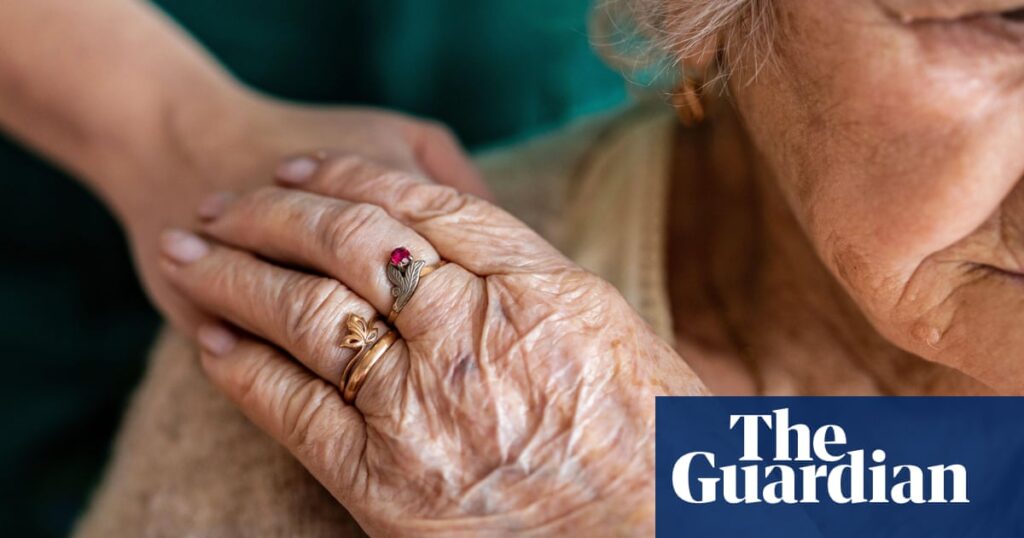Nearly 100,000 adults have been denied government-funded social care because of a decade’s worth of spending cuts, a Guardian analysis has revealed, as ministers come under mounting pressure to increase funding for the sector.
The analysis, which is based on a study by the Institute for Government (IfG), shows the number of people in England receiving subsidised care has fallen far more quickly than the country’s disability rate.
The figures highlight how a range of government cuts have put so much pressure on the English social care service that it is leaving tens of thousands of people without the access to long-term care that they would have received 15 years ago.
Stuart Hoddinott, the associate director of the IfG, said: “Financial pressure means local authorities with high levels of demand are forced to ration services to people who would receive care elsewhere.
“That injustice is compounded when caring responsibilities fall to friends and family, many of whom leave the workforce or reduce working hours to care for loved ones. The government should ensure that funding for local government reflects the need for services and that it doesn’t pass the costs of care on to unpaid relatives.”
The social care sector has faced a financial squeeze since 2010 thanks to cuts to local government budgets. The Institute for Fiscal Studies has found that councils’ core budgets are 18% lower per person in real terms than they were in 2010, with many of the cuts feeding through to social care.
With less money to pay staff, the sector has faced an employment crisis, which it has partly filled by hiring workers from abroad, many of whom have been scammed or abused in the process.
Experts say local authorities have rationed care by judging fewer people as needing it than they used to and putting more people on short-term care plans rather than long-term ones.
Meanwhile the Westminster government has also restricted access to government-funded care by freezing the financial threshold at which people qualify for state support since 2010. The Labour government continued that practice earlier this year when it announced the rules for 2025-26.
The net effect of these changes have been to restrict the number of people receiving long-term care, even as the population gets older.
The IfG’s report shows the proportion of the adult population receiving long-term social care has dropped from 2.3% in 2003-04 to 1.4% now, an estimated decrease of more than 250,000 people.
This decline has happened almost entirely in people aged 65 and over. The report shows that 8.2% of older adults received long-term care in 2003-04 compared with 3.6% in 2023-24.
The Guardian has used the IfG’s figures to compare the number of people receiving long-term social care with the number of people living with disabilities, which experts say is a good proxy for need.
after newsletter promotion
The analysis shows that had access to social care continued rising in line with disability rates, more than 98,000 more people would be on government-funded care plans now than actually are.
Mark Franks, a director at the Nuffield Foundation, which also contributed to the report, said: “The social care system is subject to big variations in quality and a patchwork of strained funding arrangements. These lead to both rationing of care and big variations in quality and availability determined by where people live rather than greatest need.”
Part of the problem has been fuelled by perceived unfairnesses in the formula for allocating central government money to local authorities, which did not take account of factors like deprivation. The government signalled its intention to change that on Friday, launching a consultation into a new funding formula that would mean less money going to wealthier councils in the south-east and more to deprived and rural areas.
But ministers are also under pressure to mitigate the effect of the government’s decision to increase both the minimum wage and national insurance contributions for employers. The Nuffield Trust has estimated the two decisions will cost independent social care employers nearly £3bn in 2025-26, with the government now looking to find extra money to make up the shortfall.
The IfG report says: “Rationing care is not cost free. The burden of reduced access to care can often fall on friends and family – predominantly poorer people and women – who step in to provide unpaid care.
“This is both unfair, and indirectly expensive for the government, as these people are less likely to be able to work full-time (or at all). Increasing access to care can therefore support the government’s goal of improving workforce participation.”


